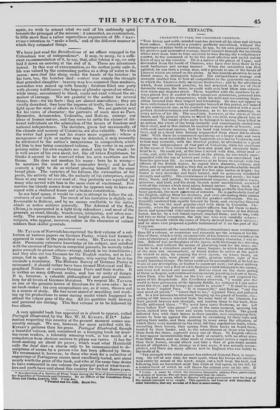WE have just read the Recollections of an officer engaged
in the Colombian war of independence. It may, to many, be a suffi- cient recommendation of it, to say, that, after taking it up, we only laid it down on arriving at the end of it. These are adventures indeed. In this war of extermination, as the author justly calls it, life was valued by the contending parties as a drop of water in the ocean: men died like sheep under the hands of the butcher : in his turn, too, the butcher died : contest was simply the struggle that preceded slaughter : bravery-was leis common than madness, cowardice was mixed up with ferocity : fatalism filled one party with gloomy indifference ; the hopes of plunder spurred on others ; while many, accustomed to blood, could not exist without the sti- mulant of carnage. We are grateful to the author for several things, first—for his facts : they are almost marvellous ; they are vividly described, they bear the impress of truth, they throw a full light upon the state oi afiairs in Colombia. We are grateful next for his views of character: the' portraits of such men as Paez, Bermudez, Arismendez, Urdenetta, and Bolivar, enlarge our ideas of human nature, and they serve to . settle flue claims of dif- ferent individuals on the admiration of the 'lovers of freedom and national independence. The sketches, given but occasionally, of the climate and scenery of Colombia, are also valuable. We wish the writer had poured out his stores more copiously : where a meagreness of style or matter may be detected, it may assuredly be attributed to the author's inexperience in composition, which led him to fear being considered tedious. The writer is an enter- prising sailor: his own exploits are stated only in the result : he is well aware of his own merit, but, like all brave Englishmen, he thinks it correct to be reserved when his own exertions are the theme. He does not mention his name : here he is wrong— he mentions the names of his comrades freely ; and he had scarcely a right to do so without placing himself on the same broad plain. The varieties of his fortune, the extremities of his perils, the activity of his life, the audacity of his enterprises, equal those of any man we ever read of they probably are equalled by many who served with him in the same state of excitement. Few survive the bloody scenes from which he appears only to have es- caped with a shattered frame and a broken constitution.
In our brief space, it would be vain to attempt to follow the ad- ventures of our author. The result of his narrative is slightly un- favourable to Bolivar, and by no means creditable to tlie native chiefs or native soldiers generally. The Admiral of the fleet, (Brion,) is represented in a light truly ridiculous ; and most of the generals as cruel, bloody, treacherous, intriguing, and often cow- ardly. The exceptions are indeed bright ones, in favour of fine subjects, who appear, however, rather in the character of valiant soldiers than skilful generals.


















 Previous page
Previous page